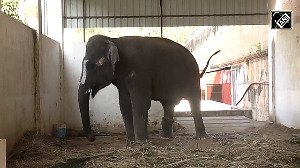
The Parliament on Wednesday passed a bill for providing a statutory framework for the functioning of the National Anti-Doping Agency and scaling up the network of dope testing laboratories in the country.
The National Anti-Doping Bill, 2022 was passed by a voice vote in Rajya Sabha. It was cleared by Lok Sabha last week along with certain amendments.
Incidentally, it is the first bill piloted by Anurag Thakur as the Sports and Youth Affairs Minister.
While responding to the debate on the bill, the minister said that currently, India can carry out only about 6,000 tests a year, and the proposed legislation would help increase the testing capacity significantly.
He said for holding any major international championship, the number of tests required could be as high as 10,000 a month. Thakur also informed the House that samples from 16 countries are tested in laboratories located in India.
The minister said that with the passage of this bill, India will join the club of select countries like the US, China, Japan, and France, which have their own laws related to checking doping in sports.
The proposed legislation is expected to benefit sportspersons and provide an independent mechanism for anti-doping adjudication and legal sanctity to anti-doping agencies.
Several amendments moved by the Opposition were negated.
Nominated MP and legendary athlete P T Usha made her maiden speech in the House while speaking on the bill, which was discussed for about six hours.
Unlike the previous 12 sittings, the House on Wednesday did not witness forced adjournments, except for a brief disruption by Congress MPs towards the end of the day's proceedings over alleged barricading of residents of Sonia Gandhi and Rahul Gandhi by Delhi Police.
At that time Thakur was replying to the debate over the bill. The protesting Congress members also walked out from the House.
Supporting the Bill, Deepender Singh Hooda of the Congress termed it a "positive step" for Indian sportspersons. He suggested that a bench of arbitration be constituted in India so that players do not need to travel to Switzerland to appeal.
Santanu Sen of the Trinamool Congress said penalties on athletes should be proportional to the offence and also backed Hooda's suggestion that an international arbitration unit be set up in Asia.
P T Usha batted for bringing all competitions under National Anti-Doping Agency (NADA) and sought more focus on the field of sports medicine and science to help players recover from injuries.
She highlighted that the country ranks third in the number of individuals who tested positive for steroids and were punished for doping.
"We are yet to open our eyes to the doping in our country which was earlier confined only to the senior national level but has now reached the junior, college and district levels. It is a serious concern which needs to be addressed," she noted.
Usha, who was nominated to the Upper House last month, said sports medicine and sports science need more focus in the country.
The bill is intended to provide a “statutory framework for the operation of the National Anti-Doping Agency (NADA), the National Dope Testing Laboratory (NDTL) and other dope testing laboratories, and for the creation of a National Board for Anti-Doping in Sports to strengthen anti-doping activities in sport”.
It seeks to give NADA powers of “investigation, levying sanctions for anti-doping rule violations, the disciplinary procedures to be adopted and the powers of inspection, sample collection and sharing and free flow of information.”
It also provides for the establishment of the NDTL and other dope testing laboratories.












 © 2025
© 2025